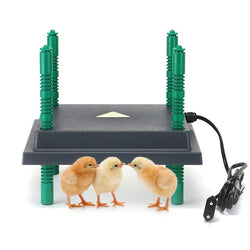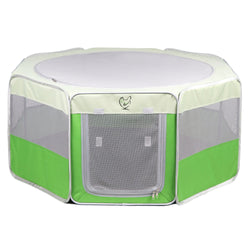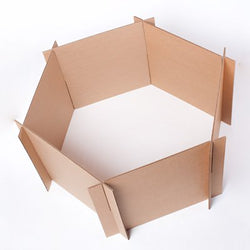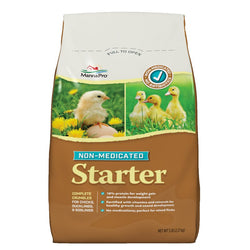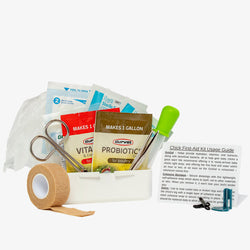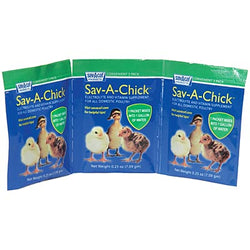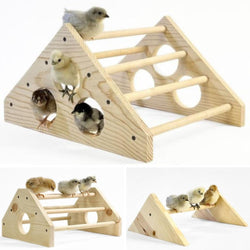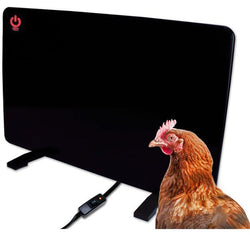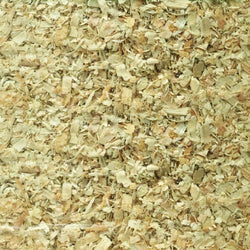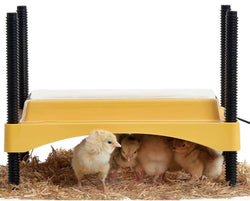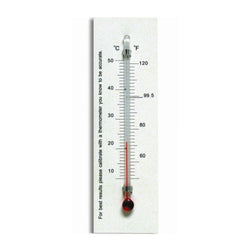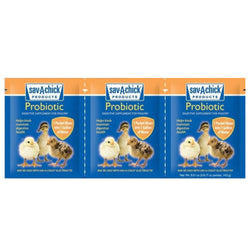How can I keep ducks out of my swimming pool? Can my ducks and geese drink and swim in chlorinated water?
Back to blog
First--no worries about chlorinated water and your waterfowl flock; it will not harm them. So if your personal pet flock finds your pool, you don't have to be concerned about their safety, but you should probably worry about yours! Why?
Animal poop can introduce harmful bacteria into a pool, including E. coli, Salmonella, Campylobacter, or Cryptosporidium ("Crypto" for short). The good news is, most types of bacteria die very quickly when they come into contact with chlorine in a properly maintained pool. Crypto may last longer since it has a protective shell, but thankfully, according to the Centers for Disease Control, there are no reports of transmission of Crypto from birds to humans at this time.
If you do find bird droppings in your pool, the Center for Disease Control's website has information about how to clean it properly.
It's best to keep waterfowl from ever becoming attracted to and comfortable with your pool in the first place. Here are some suggestions about how to do that:
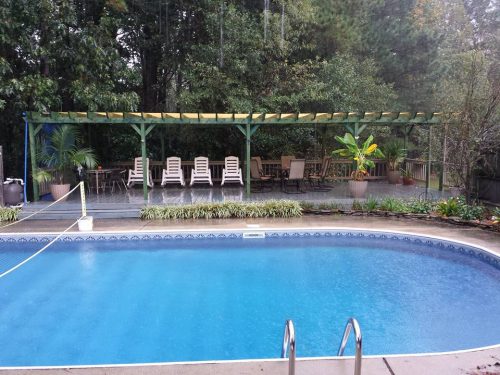
A beautiful, bird-free pool paradise.
Animal poop can introduce harmful bacteria into a pool, including E. coli, Salmonella, Campylobacter, or Cryptosporidium ("Crypto" for short). The good news is, most types of bacteria die very quickly when they come into contact with chlorine in a properly maintained pool. Crypto may last longer since it has a protective shell, but thankfully, according to the Centers for Disease Control, there are no reports of transmission of Crypto from birds to humans at this time.
If you do find bird droppings in your pool, the Center for Disease Control's website has information about how to clean it properly.
It's best to keep waterfowl from ever becoming attracted to and comfortable with your pool in the first place. Here are some suggestions about how to do that:
- Build a 2-4 foot fence around your pool. Most heavier duck breeds will not attempt to fly over this short barrier, and as long as the bottom is tight and close to the ground, they will not try to go under it, either. Please note, however: this will only work for your domestic, pet flock. Wild ducks can easily fly over such a short fence!
- Locate your waterfowl living areas far away from your pool. 'Cause distance is a good detractor.
- Use a solar cover. A solar cover looks like a huge sheet of bubble wrap that goes over the surface of your pool. It is designed to keep a pool warmer and cleaner, and can also repel curious ducks and geese.
- Leave brightly-colored objects or inflated toys in the pool. A busy-looking pool may detract waterfowl from checking it out, especially if the inflatables are predator-shaped, like alligators or snakes.
- Try an automatic pool cleaner. As it moves like a robotic snake around the pool, an automatic pool cleaner may be pretty scary to an inquisitive duck or goose.

A beautiful, bird-free pool paradise.
- Install a motion-activated sprinkler. Come too close to the pool and - gotcha! On comes the water and movement and noise...scary, right?
- Cover the pool area with bird netting. If you're not okay with putting a solar cover on the pool, you might consider placing aviary netting or even a shade cloth over the pool.
- Plan barriers into your landscape. Plant tall shrubs--but not fruit-bearing trees--around the pool. Ducks and geese are more hesitant to swim in a pond that has lots of places for predators to hide around it. Tall shrubs that do not bear fruit discourage them from taking up shop in your backyard. However, fruit-bearing trees can have the opposite effect; they could actually attract waterfowl to your pool area.
- Reduce the amount of grass around your pool. Many ducks and geese like to eat grass, so minimizing the amount of grass in close proximity to your pool may make it less inviting. It's fun to watch ducks and geese play in water, but not when they're swimming in your family's pool! You can use these tips to keep your pool safe and clean for your family to enjoy.
